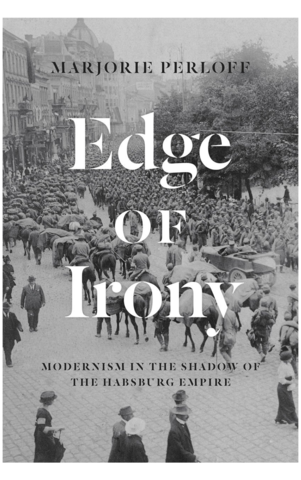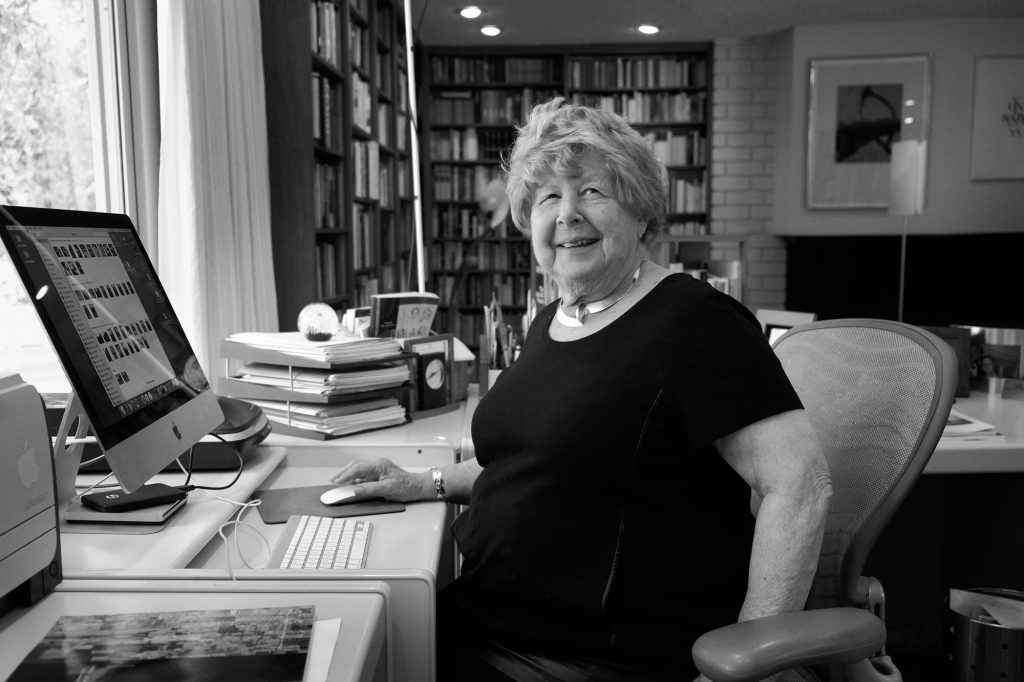 I want to start the month off by recommending Marjorie Perloff’s Edge of Irony: Modernism in the Shadow of the Habsburg Empire, published by the University of Chicago Press. The book defines what Perloff calls “Austro-Modernism,” a form of modernist thinking engendered in the years 1914 through 1933, when the Habsburg Empire collapsed and its territories became awash in a bewildering brew of nationalism, anti-Semitism, exile, and blood. Perloff differentiates Austro-Modernism from its German cousin, forged in the political cauldron of the Weimar Republic. As she writes:
I want to start the month off by recommending Marjorie Perloff’s Edge of Irony: Modernism in the Shadow of the Habsburg Empire, published by the University of Chicago Press. The book defines what Perloff calls “Austro-Modernism,” a form of modernist thinking engendered in the years 1914 through 1933, when the Habsburg Empire collapsed and its territories became awash in a bewildering brew of nationalism, anti-Semitism, exile, and blood. Perloff differentiates Austro-Modernism from its German cousin, forged in the political cauldron of the Weimar Republic. As she writes:
Weimar was the workshop for radical ideas, from Marxist theory to Heidegger’s ontological exploration of being-in-the-world to the film theory of Krakauer, Rudolf Arnheim, and [Walter] Benjamin himself. But this is not to say that Austro-Modernism, from Freud to Wittgenstein and Kraus, to Musil and Roth, to Celan and Bachmann, is to be understood as a weaker version of the strong intellectual formation of the Weimar Republic. It was merely different. Given the particular situation of the Habsburg Empire and its dissolution, given the eastern (and largely Jewish) origin of its writers, it developed in another direction, its hallmark being a profound skepticism about the power of government — any government or, for that matter, economic system — to reform human life. In Austro-Modernist fiction and poetry, irony — an irony less linked to satire (which posits the possibility for reform) than to a sense of the absurd — is thus the dominant mode. The writer’s situation is perceived not as a mandate for change — change that is always, for the Austrians, under suspicion — but as an urgent opportunity for probing analysis of fundamental desires and principles. (13; final emphasis my own)
Perloff’s analysis stretches from the “probing analysis” and documentary social satire of Kraus’s The Last Days of Mankind to the “probing analysis” and socio-erotic frisson of Celan’s later lyric poetry, with an excellent coda that muses upon Wittgenstein’s obsession with the Christian gospels towards the end of his life. Ironic satire is a dominant mode in the fiction of both Musil and Roth, but it’s a satire that, as Perloff notes, doesn’t lead to political action, but instead to contemplative action. “In the face of war, in the face of the twin evils of Fascism and Communism and of the corruption that seemed to threaten democracy at every turn, one could expose the follies and evils of one’s world, but meaningful change could only be personal,” Perloff writes. “The aim, as Wittgenstein put it — and Musil and Roth concurred — could only be ‘to become a different person.'” (15)
Although all of Perloff’s subjects were German-speakers, many didn’t start off that way. They were born not in the Empire’s capital Vienna — though Vienna remained a shining beacon of ambition for each of them — but rather on its periphery, and in many cases its easternmost periphery, speaking languages other than German. Karl Kraus was born and raised in the town of Jičín (then a part of the Austrian Empire, now a part of the Czech Republic); Joseph Roth was born and raised in the town of Brody, a small town near Lemberg, now Lviv, in East Galicia (then a part of the Austrian Empire, now a part of Ukraine); Elias Canetti was born in Ruse, Bulgaria (an independent nation then, but with close ties to the Empire); Paul Celan in the Romanian town of Czernowitz (then a part of the Austrian Empire, now also a part of Ukraine). That they can be considered various facets of that common experience that led to Perloff’s “Austro-Modernism” points to the role that the Empire played in their upbringing.
The Habsburg Empire in 1914 was a mess. Franz Josef I was considered a weak and vacillating leader; its polyglot culture made it all but impossible to administer effectively (especially by a somewhat corrupt and inept central bureaucracy); what we now call its “multiculturalism” was just as bewildering. But it was a mess that somehow functioned, and for much the same reasons. The same Empire gave rise to a Central European form of Modernism that produced composers like Arnold Schoenberg, philosophers like Freud and Wittgenstein, writers like Arthur Schnitzler, painters like Klimt and Schiele. Austrian Jews enjoyed particularly broad freedoms following the 1782 Edict of Tolerance issued by Joseph II, and in 1867 Franz Josef I formally bestowed equal rights on the Jewish population of the Empire. Indeed, in recent years revisionist historians like Pieter M. Judson have emphasized its strengths (even if, ultimately, its weaknesses led to its dissolution in 1918), suggesting that its tolerance could be something of a model for the polyglot multicultural societies of the 21st century.
The cataclysmic collapse of the Empire in 1918 left Austria a rump state. The Habsburgs were gone; in its place an unstable republic, an easy target for neighboring fascists, that would last for only 16 years (the monarchy ruled for nearly 400 years). This left Perloff’s writers, working in the years between the two world wars, with a sense of loss — that they’d been cut adrift from the land and culture of their youth. Kraus and the others weren’t sentimental about what was gone, but they recognized its strengths and opportunities as well, giving rise to what might be called an ironic conservatism in their outlook. Ultimately, the collapse was a collapse of cultural identity as well. Despite the almost unimaginable size of the empire’s territories, Musil, Celan, Roth, and the others shared a historical culture, which inevitably led to a common recognition — a recognition reflected in habits of thought, social conventions, mind, language — of their tragic situation. They harbored no optimism for the restoration of the monarchy in the years after 1918. Indeed, they harbored no optimism at all — except for the possibilities inherent in what a “probing analysis of fundamental desires and principles” might reveal about us as individuals and how we live. For this reason alone, Edge of Irony is worth a look.
I happen to be a child (or, at least, a grandchild) of the periphery of the Austrian Empire myself. My paternal grandfather Maxsym Hunka arrived at Ellis Island in 1914 from Ukraine (probably from Berezhany, Ternopil, then a part of the Austrian Empire, now a part of western Ukraine); he too was an exile from a collapsing world, perhaps sharing (in the peculiar ways of his own situation) in the habits of thought, social conventions, mind, and language of the subjects of Edge of Irony. He was far from an intellectual, receiving only a fifth-grade-level education according to US Census reports from later years. But if there can be said to be a cultural DNA just as influential upon us as our biological DNA, passed down in the form of these habits through the generations, they might generate in us an affinity for characteristics of our ancestral cultures, its origins barely recognized in our individual histories unless we look for them.


 I want to start the month off by recommending Marjorie Perloff’s
I want to start the month off by recommending Marjorie Perloff’s